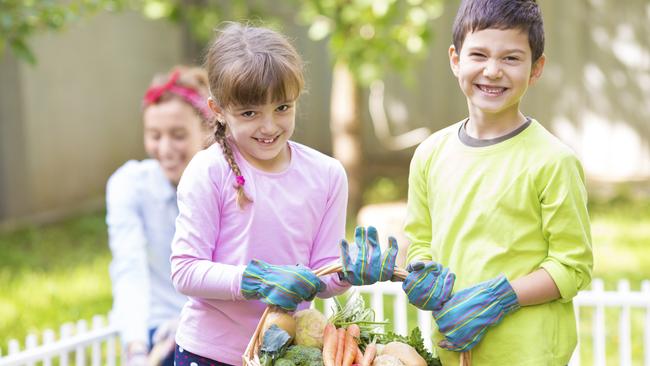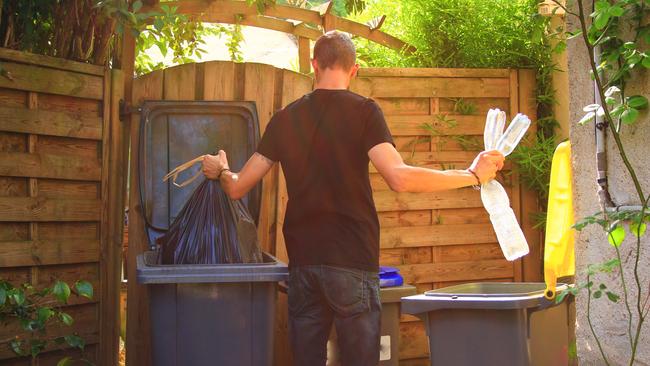Sustainable living: 20 eco-conscious habits to embrace
From borrowing toys to giving vegie scraps to your neighbours, small habits can make the world of difference and they don’t require a lifestyle overhaul.

SmartDaily
Don't miss out on the headlines from SmartDaily. Followed categories will be added to My News.
Adopting a more eco-conscious life doesn’t have to be difficult – in fact, there are many ways you can incorporate sustainable practices without a dramatic lifestyle overhaul.
From sharing vegie patches in urban communities to joining your local toy library, here are 20 ways your family can live a more sustainable life, as featured in the March Wellness+ sustainability issue.
1. Swap plastic straws for alternatives
With single-use plastic one of the main culprits behind global pollution, opt for more environmentally friendly options, such as metal straws, which are reusable and non-toxic.
2. Recycle bottle and cans
This helps to reduce waste that would otherwise go into landfill. Keep a bucket or bin for recyclable bottles in your house, and make the occasional journey to a drop-off point or collection bin once it reaches capacity.
3. Download a waste-sharing app
A growing number of people are adopting more enviro-friendly practices via waste-sharing apps
such as ShareWaste, which enables users to locate neighbours who want to fill their compost bins, taking the difficulty out of recycling on the go.
4. Start meal planning
Getting organised when it comes to your family meals is not just for those saving pennies or watching their
diets; it’s an effective method for reducing excess food waste. By planning ahead, you are more likely to buy ingredients with specific portions and recipes in mind.
5. Think food sharing
From shared vegie patches to shared harvests, this is another food-saving phenomenon gaining popularity around the world. Food sharing enables people in urban communities to share fresh, homegrown produce with each other, spearheaded by international projects such as ShareCity.
6. Get fashionably eco-conscious
Apps such as Depop and eBay make second-hand shopping more accessible than ever.
7. Give your wardrobe a makeover
Rework existing pieces in your wardrobe to give them new life, through subtle tailoring or a complete restructure.
8. Shop for second-hand furniture and electronics
This has a direct impact on reducing waste – just be sure to check for wear and warranties when making any purchases.

9. Be mindful when recycling
Educate yourself on which items are considered soft plastics versus hard plastics, to help prevent contamination.
10. Install blinds and draught stops
These will help keep your house cool in summer and warm in winter. It also means less dependence on airconditioning and heating, which can reduce your power bill.
11. Keep your showers short
A standard showerhead releases 15-25 litres of water a minute, which equates to roughly 120-200 litres down the drain for every eight-minute shower. Further reduce water waste by investing in a water-efficient showerhead.
12. Swap your shampoo bottle for shampoo bars
Shampoo bars are as practical as they are sustainable, forgoing the need for plastic packaging thanks to their solid formulation.
13. Smarten up when it comes to your laundry load
Rather than buying laundry detergent in plastic bottles, look for brands using cardboard or biodegradable packing.
14. Become a green thumb
Invest in a water tank to help conserve and reuse water in the garden. To reduce water evaporation when gardening, water your plants in the early morning or at night, when the sun isn’t as powerful.
15. Invest in a compost bin
Compost helps to reduce landfill and unnecessary waste while enriching the soil with nutrients.
16. Harvest your own vegetable patch
Growing your own food is a great way to increase resourcefulness,
while reaping the rewards of fresh, natural produce.
17. Think cruelty-free beauty
With animal testing considered an increasingly dated practice, educate yourself on “clean” beauty and make an effort to purchase from cruelty-free brands, to help set the standard.
18. Consider using reusable sanitary products
While sanitary products are essential for women around the world, their contribution to waste and pollution doesn’t have to be. Look for alternatives such as menstrual cups, cloth pads and period undies, all of which have a more less
impact on the environment.
19. Seek out swap groups
These are a great way to part with items you no longer need in exchange for something you would have otherwise bought new.
20. Join a toy library.
Given the fast pace that kids outgrow toys, joining a toy library is an ideal way to save money. Borrow toys every few weeks rather than buying them.
For more sustainable lifestyle ideas, check out the March edition of
Wellness+, in your paper this Sunday.





